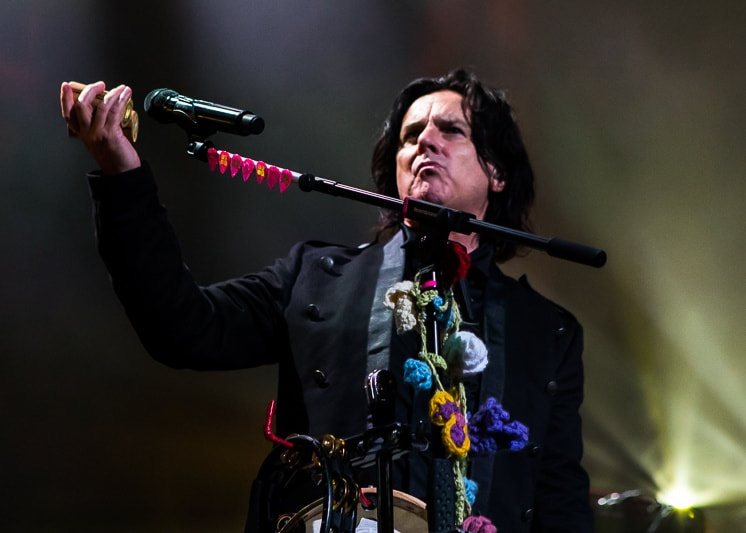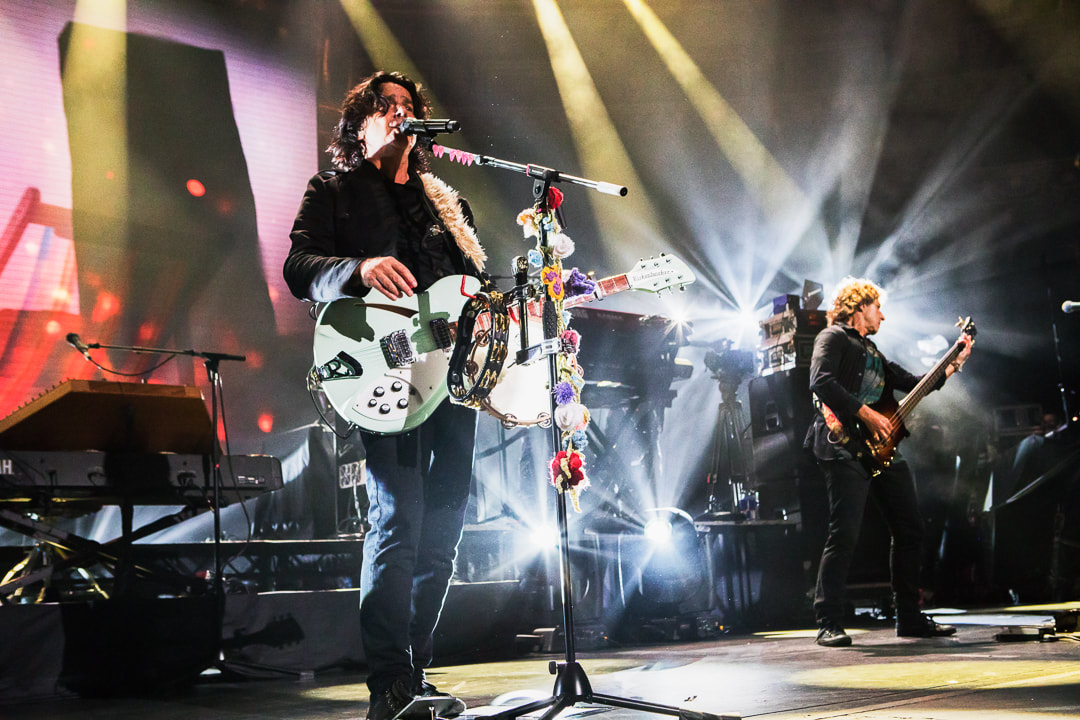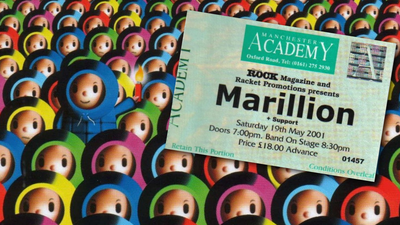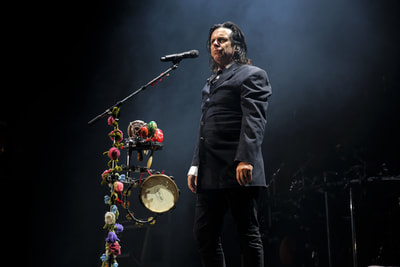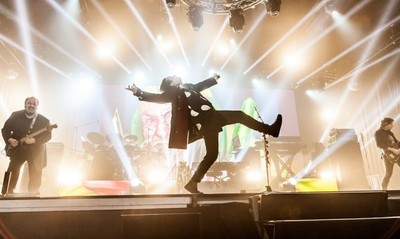|
It’s been an incredible eighteen months for Marillion. A top five album, some of their best reviews in decades, and a career topping sell-out show at London’s Royal Albert Hall have all crowned their incredible renaissance. Preparing to hit the road for a final run of UK & Ireland dates in support of ‘F.E.A.R.’, we sat down with vocalist Steve Hogarth for an in-depth chat about the South Kensington show, the lasting legacy of the band, and their return to Ireland. The invisible man; Eamon O’Neill.
How are you today?
I’m fine actually. I’m home alone, and it’s very, very rare, so I’m enjoying a bit of peace. You’re just back from a relatively extensive American tour; how was that? It was a good tour, actually. We were playing the places we don’t normally go to - some for the first time in the band’s career. The band’s never played in Florida or Texas before, and it was most enjoyable. The band were in good form and the social media feedback was all pretty glowing, so everyone was happy. The tour is a long way from what was your first ever crowdfunding exercise back in 1997, which financed bringing the band to the States. The guy who actually began that whole thing was a guy called Jeff Pelletier. He was the guy who actually opened the bank account of his own volition and started up a thread on a notice board on the internet and said; “If you want to see Marillion – send money”. There wasn’t any involvement from us until, I think, he’d already got about $20,000 in the bank. He came to one of the shows on this tour, and I actually shouted him out and dedicated the entire night to him, because without him, our careers probably would have been totally different. That was back in your ‘indie’ years, when things were relatively difficult for the band. They were, but I mean, you could argue that these are still our indie years. But in those days, we parted company from EMI, and we were doing deals with independent labels. We never had any problem getting hold of a record deal, but we kind of felt that perhaps the impetus was draining away, in the business sense, and that it wasn’t really getting us anywhere. It was really what Jeff started off with the American crowdfund, and the then fact that we took that up and turned it into, for want of a better word, a business model, that kind of put us firmly in charge of our own destiny, creatively and in a business sense, from that day forward. The band has reached some amazing highs in the last eighteen months; particularly with the success of the ‘F.E.A.R.’ album and the Royal Albert Hall show. Yeah, we’ve had a fantastic year, but we just put our heads down and get on with it, as we will pretty soon. We’re starting to begin jamming now in the studio for what will at some point become our next record. We’ve always just got on with it, but it’s undeniable that in the last year we’ve had some amazing moments, and R.A.H. was probably a bit of a pinnacle; not just in terms of playing such an iconic building, but everything came together for that show. People flew in for it from all over the world, and it just had the most incredible atmosphere. We decided to film it, and we decided to spend a lot of money on the production, so we put on a big show in there. The whole thing just came into phase on that one day, and proved to be such an amazing occasion. The show was a real coming together of both band, and fans. What I hadn’t really realised until after the show and talking to people and hearing the buzz on social media, was how the people who were there, the audience had actually arrived there with the determination to make it a special night for us; which is kind of the wrong way around, really; we’re supposed to be doing it for them! [*laughing*] Not only had they bought tickets, but they’d arrived with a mission to make the night truly memorable for the band. I don’t think there’s a lot of bands on earth that have got fans that well looked after like us, in their hearts. It’s quite extraordinary. Click HERE for eonmusic's report from Marillion's Royal Albert Hall gig. Did you feel a lot of pressure riding on you and the band to pull off something truly special that night?
Well the pressure was colossal, for me particularly. I’ve said before I felt a bit like Charles Atlas walking out there; I felt like I was holding the entire building up. I so wanted it to be extraordinary; I wanted everything about it to be the ultimate. As singer and front man and all of that, that pressure probably weighs a little heavier on my shoulders than everybody else’s. Also of course, singing is an organic process; it’s not quite like playing the guitar or the keyboards or the drums; your voice is going to do what it’s going to do on the night, and you’re going to have what you’re going to have, and if you’re mid-tour as we were, quite often you’re not singing at your very best, because you’re just a little tour-weary. I always lose a couple of notes off the very top of my range when we’re touring just from all the hours of screaming. Our shows are long – typically, two and a half hours – and I do sing very hard; I’m not exactly a crooner, so there’s always a little bit of damage that I’m carrying. Were there any moments in particular during the show that you were concerned about? There were certain songs during that performance; ‘The Space’ - which was the first song of the second half of the show where we performed with the little sextet - I wasn’t quite sure whether I’d make it through the last section of the song, vocally. So that was very stressful, and that thought didn’t wonder far from the front of my mind for the whole day, from the moment I set foot in the building. But I mean, getting in there and sound checking, and actually being on that stage in that space, was something else. But if anything, it cranked up the pressure. How did it feel stepping out onto that stage to be greeted by that full house? The reaction walking on stage from that sold out crowd, to see that there didn’t appear from where I was standing to be an empty seat, and to feel that vibration from everybody was really moving. Again, it was tempered all the time by a desire to live up to the vibe. It’s lovely to be adored, but you want to earn it; you don’t want to just stand back and go; “Oh yeah, cheers, aren’t we great?”; you’ve got to leave people at the end of the night going; “My God, I always knew they were good, but they’re better that that, aren’t they?” That’s what you want to aspire to. Now that the show is getting a DVD release, are you looking forward to viewing it from that angle? Well, I had to watch it to approve it. In the old days they used to send me a DVD to watch a home, but I’d find that so stressful because if there’s anything I don’t like about it, I’d lie awake all night fretting about it before I could get on the phone and do anything. Now what I do is, I go to Tim Sidwell who edits the whole thing, and I sit in and I watch it, and if there’s anything I don’t like about it, we change it on the spot, so that I don’t die of stress worrying about it! [*Laughing*] So, I’ve already been and aged ten years. I mean, it’s awful staring at yourself; I absolutely hate it. I’m not particularly keen on listening to myself, but watching myself singing is a bit of a double whammy. You’ve got to do it, but I find it deeply stressful. I mean, you remember yourself fifteen years younger; I still think I look like I did when I was 40, and the only time I don’t think that is when I look in the mirror, which always comes as a shock, or seeing myself on film, which is a double shock. It’s that reminder of how old you’ve got. Marillion are preparing to hit the road again for another round of dates; has the set list changed much since the beginning of the tour?
Yeah, it’s been redesigned again. We put a different set together for the U.S., and we sat in a circle after that and put another set together for the forthcoming shows. What’s likely to happen is that it might change again. What we like to do is have about sixty or seventy percent of the show fixed, and thirty percent which may change from one night to another. We’ve got quite a lot of fans who will turn up at several of these shows, and we don’t want them to see us going through the motions and playing the same set over and over again, so we vary it from night to night. Is there ever a point when someone goes; “I’m not doing that song!” Well, we’re never quite that blunt, but you can usually tell if that’s the feeling. You can get a sense of a reluctance to play a song, and I guess they’re the songs that we’ve never played. There’s songs in our catalogue that you’ll just never hear live. I don’t think that’s necessarily because they’re hated and despised; it’s just because we tend to have so much low key material that if we were to trot all of that out in one set, it would be quite a sombre occasion. There’s always an emphasis that comes - especially from Ian [Mosley], our drummer - to have enough noise and tempo to keep the atmosphere up and keep the audience in a good place. Would you like to do a show that featured exclusively low key material? I’ve often wondered what it would be like to go out and play just all the slow, quiet, doomy stuff. It would be a completely different atmosphere on the night; it would be quite intense, and you wouldn’t expect people to leap to their feet and put their hands in the air and go nuts. You’d just expect them to sit and listen, and there’s nothing wrong with that either. One of my favourite bands ever is The Blue Nile, and I used to go and watch them, and I would just sit and quietly weep, because they were so moving and it was so intense, and so beautiful. Nobody was leaping to their feet and jumping around because that wasn’t the point; they would stand up and give them an ovation at the end, and we’d be capable of that. I think our rock roots perhaps prevent us feeling able to do that, even though we could easily do it with the music that we’ve written. You’re returning to Ireland on this forthcoming run; what does it mean to you to perform ‘Easter’ in Belfast? Oh man, I remember playing ‘Easter’ in Belfast in that funny little gig where we couldn’t get half of the equipment in, down by the Botanic Gardens; was it The Empire or something? It was something very imperialistic, and I remember thinking; “There’s no wonder there’s trouble here!” [*Laughing*] It was a funny little gig, but the atmosphere itself was amazing, and singing ‘Easter’ was right off the scale. I wrote that song before I ever met Marillion, and from the day I wrote it, I thought; “One day I’m going to stand on a stage in the north of Ireland and sing this song, and I hope they take it to their hearts”, because that’s what I wanted it to do when I wrote it. When you write about someone or about a nation, or about a bunch of people, or a country or a culture; you always think; “Well, what if they all just think this is rubbish?” It would be heart breaking. But, playing it in Belfast, and the reaction to it, and seeing the people sing along to those words was immense for me. There’s no way on God’s earth that it will be left out of the set in Belfast. You filmed the video for ‘Easter’ at the Giant’s Causeway in Northern Ireland.
Yes, and I remember it being bloody cold! I was wearing god knows how many layers of clothes. It was well cold down there. It’s mostly standing around all day - the process - and there’s not a lot down there on the sea; there really isn’t anywhere to take shelter. We got back to the hotel after the first day’s shooting, and we switched the news on, and the Berlin Walling was coming down. So we actually made that video the day that the Berlin Wall came down, so that was quite extraordinary. That was back in 1989 when you’d first joined the band; did you feel at that time like you had to make something of a statement that this was a 'new' Marillion? No, not really. I wouldn’t have joined the band if they’d have wanted anything except what I am, and I said that at the very first meeting. First of all, I wasn’t that bothered about getting the gig because I had already agreed to play piano on a tour with a band called The The with Matt Johnson. I’d played some piano on his ‘Infected’ album, and a few albums later he’d done an album called ‘Mind Bomb’, and was about to go out on tour with Johnny Marr from The Smiths, and I was right into that and was looking forward to doing it. Then the phone rang and Marillion wanted to meet me. They said; “We’ve heard these songs that you’ve written and we’ve heard what you sing, and we just want you to do what you do, and we’ll do what we do, and let’s see what happens”. So it was presented to me as an experiment to start with, that they were obviously completely willing to move forward naturally, with a different human being doing different things at the front. So there wasn’t any kind of reference to what had gone before; they just said; “Be yourself”. So, that’s a great brief to be given, and that’s the reason I joined the band. Marillion’s impact has gone beyond music, with ‘Out Of This World’ directly leading to the discovery of adventurer Donald Campbell’s body; could you have anticipated that song would have been the catalyst? No, it’s a great honour, and a terrific outcome from having just thrown a few words down all of those many, many years ago. Again, ‘Out Of This World’ came from some words that I’d thrown down long before I met Marillion, in a note book. There was hardly anything there; “Three hundred miles on water in your purpose-built machine”, and all of that I’d written and tried to capture that moment of screaming along that lake, and that machine taking to the sky. When we were writing ‘Afraid Of Sunlight’, I dug it back out and we found that it worked to that piece of music, and it became ‘Out Of This World’. I never could have imagined that it would have led me to singing that song at the man’s funeral, which was ultimately, what happened. At the end of all that, they took the Bluebird [craft] back out of the lake, forty years, or so later, and I was invited by Gina, his daughter to sing the song at his funeral in Coniston church. That was incredible and surreal; I mean, I remember sitting with my mum watching it happen all those years ago in the sixties, and seeing her crying, and not really understanding and thinking; “Why is my mum crying? What’s happening?” And she explained to me that this man had lost his life. And all of those years later, I was standing in front of the great and the good next to his coffin singing a song for him, and not just a song for him, but a song that had actually resulted in him no longer being at the bottom of a lake. And then once again, a bit like what happened with ‘Easter’ and The Berlin Wall, it turned out that the day before that funeral, me and an engineer were in the church sound checking the equipment, and that was 9/11 and the World Trade Centre was coming down. So that funeral didn’t just happen for me with a sense of serene, surreal privilege, but also in the complete aftershock of wondering if World War III was about to start. Does it amaze you that the effects of writing that song could outlive the band? It’s totally mind-blowing. I’ve had the most incredible life. At the end of the day, I was just a working class kid from Doncaster off a council estate. When I was young I felt I was destined to live a very ordinary life, and yet all these incredible things have happened to me, and some of my words and my music have had colossal impact around the world. All I can really feel is lucky, and grateful, really. Finally, what would you say you’re proudest of in your career with Marillion? Well, just the people who’ve emailed me and said I’ve pulled them back from the brink sometimes, when they’ve been despairing. I’ve met a number of people over the years who’ve looked me in the eye and shook my hand and said; “You don’t realise, but you’ve saved my life”, and nothing is bigger than that, really. Like this interview? Like us on Facebook and follow us on Twitter for regular updates & more of the same. For Marillion vinyl, CDs, deluxe editions & more, click here. |
|
Marillion
"When I was young I felt I was destined to live a very ordinary life, and yet all these incredible things have happened to me. Some of my words and my music have had colossal impact around the world." - Steve Hogarth.
© 2016 - 2024 eonmusic.co.ukContact: [email protected]
|

